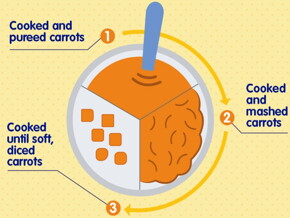
The importance of responsive feeding for lifelong health
As a parent who is introducing your little one to complementary feeding, you may find yourself encouraging your baby to have “just one more spoonful” of food or to finish what’s in their bowl. Instead of focusing on how much your baby is eating, pay attention to the signals from them.
Watch, listen, feed
When it comes to offering your baby food, recognizing and responding to their hunger and fullness cues in a timely manner, without pressuring or restricting how much they eat, is the foundation of responsive feeding. Your baby can’t use words to tell you they want food, or they’ve had enough, but they will let you know in other ways.
For example, introduce your little one to nutritious new flavors with Gerber Oatmeal, Apple & Spinach baby cereal, made for babies 6 months and up.
The principles of responsive feeding:
- offering a variety of healthy foods at regular meal and snack times
- creating a warm, nurturing environment for feeding times
- recognizing your baby’s hunger and fullness cues and responding appropriately
- only offering food when your baby is hungry, not as a reward or punishment
Remember that babies are born with the ability to recognize when they’re hungry or full. Now that you are offering complementary foods, your baby still has the ability to eat when hungry and stop when full. “Tune in to your baby’s cues now and your little one will reap the health benefits later on,” reiterates Lisa Fries, PhD, Behavioral Scientist at Nestlé Research Center in Switzerland. “Babies whose parents practice responsive feeding tend to eat a healthier diet and maintain a healthier weight. By forcing another spoonful, you could override your baby’s natural ability to self-regulate how much she eats.”
As long as you offer nutritious foods, and pay attention to your baby’s hunger and fullness cues, there is no need to try to get them to eat more or less than they choose. - explains Dr. Fries
Sources
Black MM, Aboud FE. Responsive feeding is embedded in a theoretical framework of responsive parenting. J Nutr 2011; 141(3):490-4.
Dattilo AM Programming long-term health: Effect of parent feeding approaches on long-term diet and eating patterns. In: Early nutrition and long-term health, mechanisms, consequences and opportunities. Ed., Saavedra and Dattilo, Elsevier, 2017:471-95.
Dinkevich E, Leid L, Pryor K et al. Mothers’ feeding behaviors in infancy: Do they predict child weight trajectories? Obesity (Silver Spring) 2015; 23(12):2470-6.
DiSantis KI, Hodges EA, Johnson SL et al. The role of responsive feeding in overweight during infancy and toddlerhood: a systematic review. Int J Obes (Lond) 2011; 35(4): 480-92.
Gross RS, Mendelsohn AL, Fierman AH et al. Maternal infant feeding behaviors and disparities in early child obesity. Child Obes 2014: 10(2):145-52.
Gross RS, Mendelsohn AL, Fierman AH et al. Maternal infant feeding behaviors and disparities in early child obesity. Child Obes 2014: 10(2):145-52.
Savage JS, Birch LL, Marini M et al. Effect of the INSIGHT responsive parenting intervention on rapid weight gain and overweight status at age 1 year: A randomized clinical trial. JAMA Pediatr 2016; 170(8):742-9. doi:10.1001/jamapediatrics.2016.0445
Thompson AL, Adair LS, Bentley ME. Pressuring and restrictive feeding styles influence infant feeding and size among a low-income African-American sample. Obesity (Silver Spring) 2013; 21(3):562-71.





















